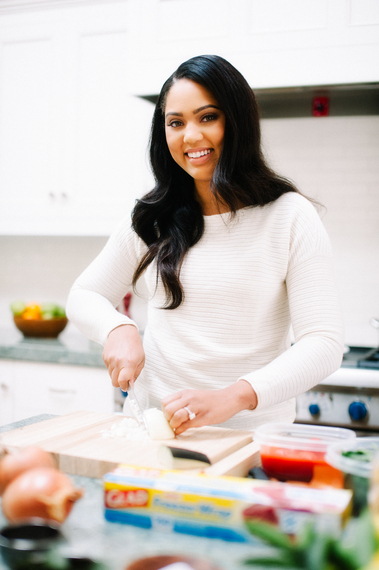You might think the likes of Ayesha Curry, wife of Warriors basketball pro Stephen Curry, has better things to do than worry about food waste. After all, she's about to launch her first cookbook, reportedly has a Food Network show in the works, is raising young two daughters, and nourishing a husband to basketball superstardom. But as part of an Earth Day campaign, she set out to educate busy families on the impact of food waste on the environment, and what each of us can do about it.
I recently chatted with Ayesha on the subject and she told me that the average American family throws out $2200 worth of food a year. "That's a lot of money that could be going towards something else," says Curry. Add to that the fact that food is now the single largest contributor to landfills, resulting in greenhouse gases, and there's reason for real concern. Curry shared five simple tips on how she learned to minimize food waste in her own home and how other families can do the same:
Do some prep work -- A little advanced prep can minimize what gets used versus tossed in the trash. "I know it's hard as a busy mom, but if you take just 30 minutes a week to prep, it makes all the difference," she explains. Curry suggests washing and drying your lettuce and storing it with a paper towel in a zipper food storage bag to keep things fresher longer. Same goes for kale and other greens. The happy upside of all of this is that you will also have healthy food on hand rather than being tempted to reach for junk.
Make use of your freezer -- Store food you know you aren't going to get to by freezing for later. Curry is a fan of using Freezer Wrap for storing fish or chicken, which she says works like a charm. Since her husband is a big fan of ice cream, often rotating half of a dozen flavors at once, she'll lay a piece of that same wrap over a container before putting on the lid. "It prevents freezer burn like nothing else, " she says.
Store what you don't use -- Rather than tossing the extra bit of chopped onion or surplus mushrooms that don't make it into a recipe, wrap and store them in the fridge or freezer for next time. Curry says she's been surprised by how well most vegetables do when frozen, noting that mushrooms will keep for up to a year this way.
Take meals to go -- Taking food to work or school, thus minimizing leftovers that land in the garbage, is key. "Stephen is in the playoff season right now." says Ayesha. "So I pack up meals in Gladware that he can take with him."
Involve the kids -- Even though her two are tiny, it's never too early to start modeling mindful behavior around food waste. Instead of throwing out the half eaten apple your child left on the counter, cut it into slices and pack it into a container for later. "It's leading by example," suggests Curry.
Read more from Katie Morford on her blog, Mom's Kitchen Handbook, or follow her on Instagram.
